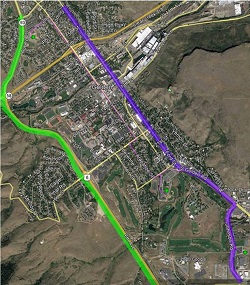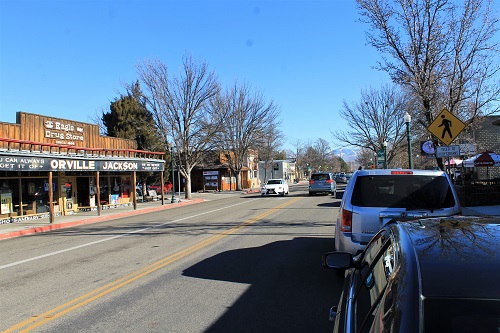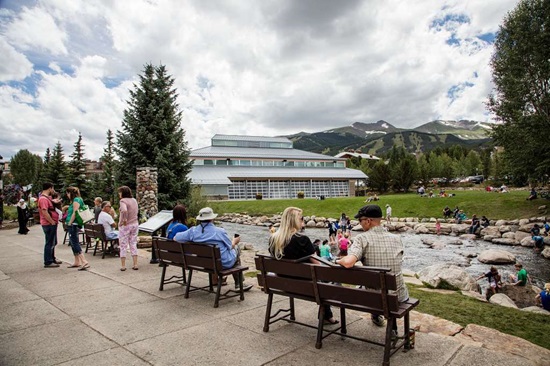
Fast, affordable Internet access for all.

Golden, Colorado has struck a new right-of-way agreement with Google Fiber that should expedite the competitive delivery of affordable fiber to the city of 20,000.
The deal gives Google Fiber non-exclusive access to public right-of-way to build a commercial broadband network, though it delivers no guarantee of uniform access across the entire city.
In a memo to the Golden City Council, Chief Innovation and Technology Officer Jiles McCoy said the city’s new agreement “would act as a template for any future companies wishing to build broadband services in the Golden right of way.”
The move comes after years of discussion in the city as to how to improve local broadband competition, reduce prices, and expand affordable access.
In 2016, Golden residents voted to opt out of a now defunct state law, ghost written by regional broadband monopolies, restricting the construction and operation of community owned and operated broadband networks. Last year Colorado leaders finally eliminated the law completely, opening the door to greater expansion of community-owned networks.

In 2019 the city completed a feasibility study showing that the construction of a full city-owned fiber network would cost $37 million. Instead of tackling the entire project at once, advisers recommended the city proceed in phases, beginning with the construction of a $3.8 million, 10.5 mile fiber ring connecting key community anchor institutions.
Eagle, Idaho is preparing to connect the first of the city’s 32,000 residents to a new, municipally-owned open access fiber network. The project, which the city says will take between five to 10 years to complete, is being heavily funded by federal grants, and aims to meaningfully boost broadband competition – and affordable access – citywide.
ISLR profiled Eagle’s efforts last year, noting that the $5 million initial downtown fiber loop was jump-started with the help of the city’s $6.7 million allotment of American Rescue Plan Act (ARPA) funding.
Roughly 300 homes and 30 businesses should be able to connect to the network within the next six months, the city now says. More than 30 residential subdivisions are in the early deployment phase, and the project will expand steadily over the next decade, funded by revenues from existing subscribers and future state and federal grant opportunities.
Like countless American communities, Eagle suffers from a notable lack of competition between regional phone giant Lumen (formerly Centurylink, now operating under the Quantum brand), and regional cable company CableOne (under the Sparklight brand). That muted competition results in high prices, spotty access, slow speeds, and substandard customer service.

Enter Eagle’s open access fiber network, which will allow numerous ISPs to compete in layers, driving down market entry costs for providers and broadband access prices for consumers. City leaders say the aim is to offer symmetrical gig speed service for between $50 and $60 to residents, and $150 per month to local businesses.
Blue River, Colorado (est. pop. 882) is the latest Colorado municipality to explore building its own broadband network with an eye on affordable access. The town is part of a trend that’s only accelerated since the state eliminated industry-backed state level protections restricting community-owned broadband networks.
Just south of Breckenridge in the central part of the state, Blue River is nestled in one of the more rural parts of Summit County. Comcast (Xfinity) enjoys a broadband monopoly, resulting in spotty access, slow speeds, and high prices. Locals also routinely complain that cell phone service remains spotty in much of the mountainous area.
In response, town leaders recently hired the consulting firm, NEO Connect, to explore the possibility of building a town-wide fiber network. According to a feasibility study presented to the Blue River Board of Trustees by Mayor Toby Babich, the construction of a fiber network serving every town resident will cost somewhere in the neighborhood of $13 million.

While that “may seem out of reach,” Babich recently told the board, “we believe with the right funding and partnership we can move forward with this project.”
The estimates for network construction range somewhere between $7 million to $24 million, depending on how much underground trenching work is required.
In 2021, California passed Senate Bill 156, an ambitious plan allocating $6 billion to shore up affordable broadband access throughout the state.
Among the most notable of the bill’s proposals was a plan to spend $3.25 billion on an open-access statewide broadband middle-mile network backers say could transform competition in the state.
An additional $2 billion has also been earmarked for last mile deployment. Both components will be heavily funded by Coronavirus relief funds and federal Broadband Equity, Access, and Deployment (BEAD) subsidies as well as California State Government grants – with all projects to be finished by December 2026 as per federal funding rules.
But while California’s proposal has incredible potential, activists and digital equity advocates remain concerned that the historic opportunity could be squandered due to poor broadband mapping, a notable lack of transparency, and the kind of political dysfunction that has long plagued the Golden State.
Massive Scale, Big Money, Endless Moving Parts
Still, California’s prioritization of open access fiber networks could prove transformative.
Data routinely indicates that open access fiber networks lower market entry costs, boost overall competition, and result in better, cheaper, faster Internet access. Unsurprisingly, such networks are often opposed by entrenched regional monopolies that have grown fat and comfortable on the back of muted competition.